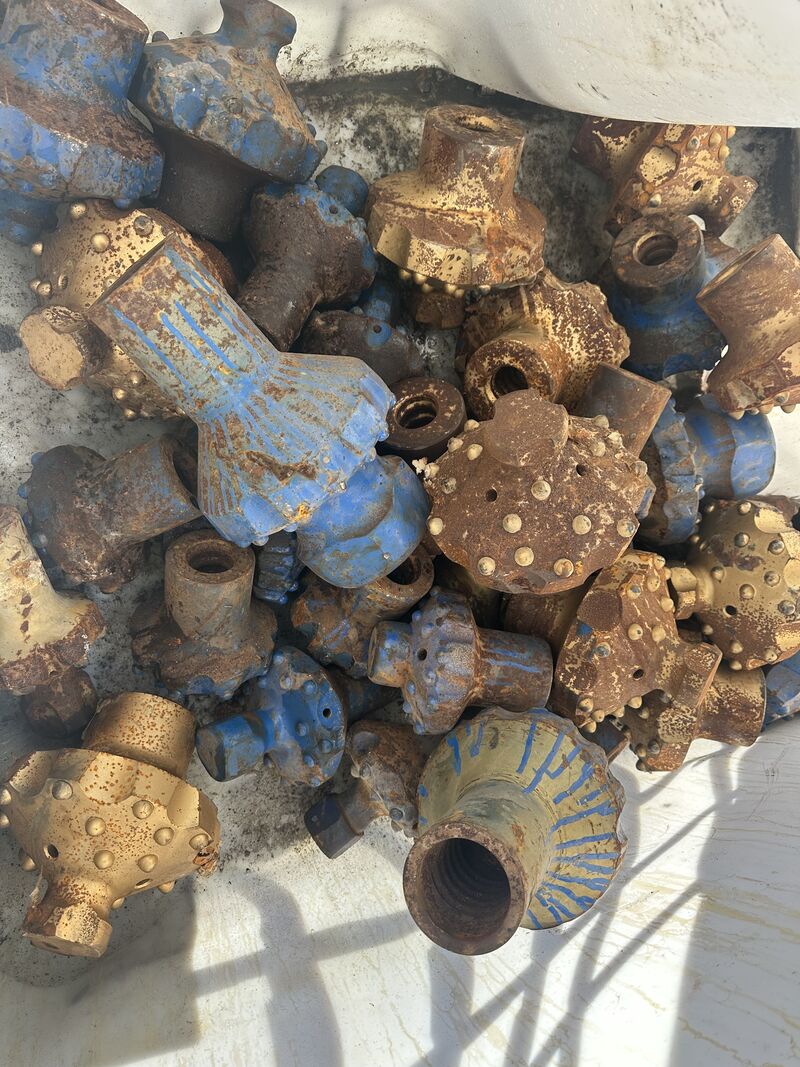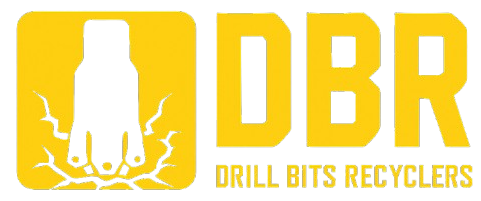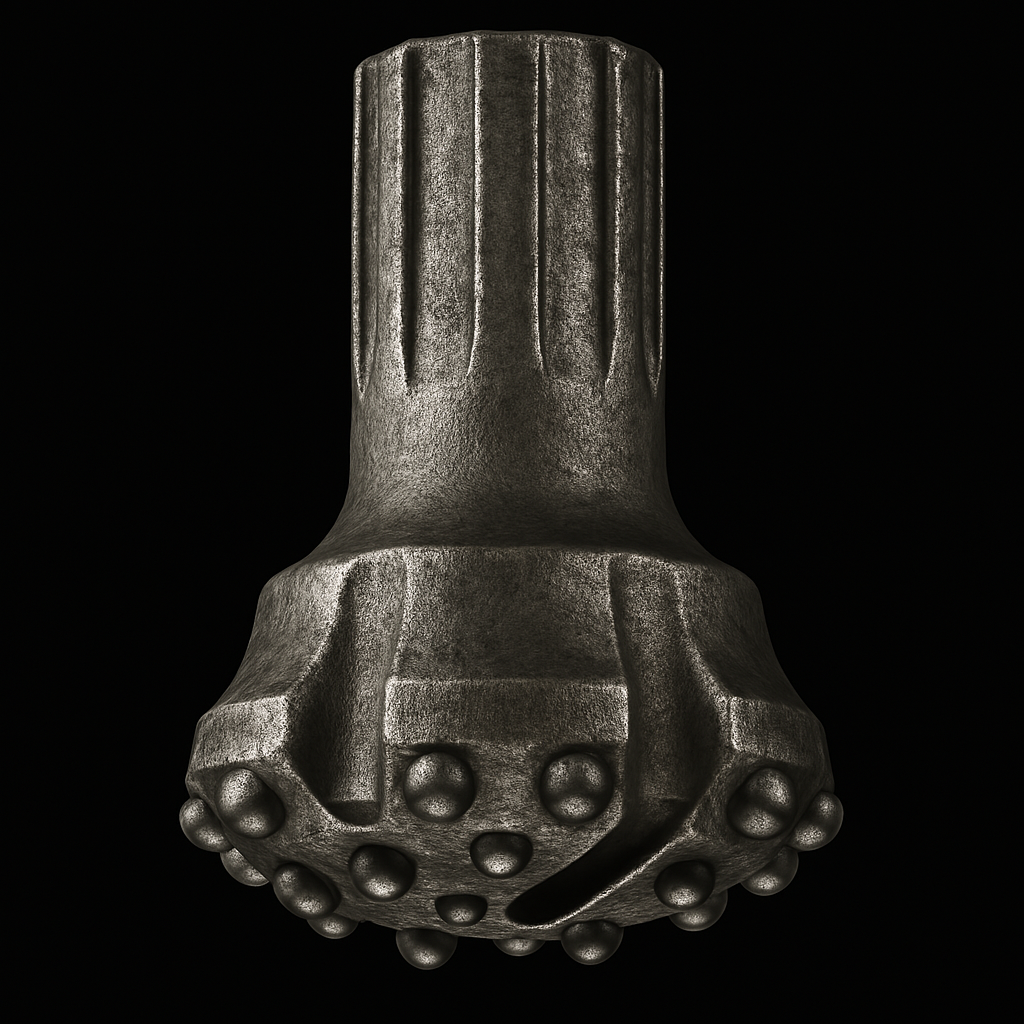Why Your Mining Drill Bits Are Worth More Than You Think
Hidden value lurking in your WA equipment shed
The Untapped Value in Worn Drill Bits
Across Western Australia, mining sites and workshops are filled with forgotten buckets of worn drill bits, tools that did their job, got dull, and were tossed aside as worthless. But here’s the truth most operators miss: those old bits are sitting on serious scrap value.
Many WA site managers and workshop teams assume that once a drill bit breaks or dulls, it’s fit for the bin. In reality, those same bits are packed with high-grade metals, especially tungsten carbide, that fetch premium prices on the scrap market.
And the market isn’t quiet. Global demand for critical minerals like tungsten is rising fast. Driven by supply chain risks, ESG targets, and surging industrial applications, manufacturers are paying more than ever for recycled tungsten. That puts WA operators in a unique position to turn worn tools into working capital, if they know what to look for.
In this guide, we’ll show you:
- What makes drill bits valuable to recycle
- Which types of bits hold the most tungsten
- How to test, sort, and sell for top dollar
- Where to recycle your scrap bits in WA for maximum return
If you’re in mining, drilling, or site maintenance, this article could change the way you look at that old crate in the corner. Because when it comes to drill bits, what looks like scrap could add up fast.
Why Mining Drill Bits Hold Hidden Value
Materials That Make WA Drill Bits Valuable (Tungsten, Steel, Carbide)
Most drill bits used across Western Australia’s mining and drilling operations are built tough, and that toughness comes from materials like tungsten carbide and high-grade tool steel. These aren’t cheap metals. Tungsten, in particular, is classified as a critical mineral, with dense, abrasion-resistant properties that make it ideal for hard rock drilling. Even after a bit wears down or fractures, the tungsten content inside remains valuable. In fact, pure tungsten carbide inserts can retain up to 90–95% of their original scrap value. That’s a far cry from low-grade steel scrap, which is often paid out at just a few cents per kilo. And it’s not just the big bits. Smaller components, tips, inserts, and brazed cutters, often contain bonded tungsten and cobalt alloys that are worth separating and recycling. The more you can sort and identify, the more your load is worth.
Rising Global Demand for High-Grade Metals
WA sits at the heart of Australia’s resource economy, and the world is watching. With supply chain disruptions across Asia, global manufacturers are now competing harder for recycled tungsten, especially from trusted regions like Australia.
Tungsten is in demand not just for mining tools, but also for:
- Aerospace components
- Oil and gas drill heads
- Electric vehicle and battery production
- Military and defence systems
For WA operators, this means higher per-kilo rates for clean, high-content scrap, especially when selling to a specialist recycler who understands metal grades and global price trends.
Scrap Market Trends Impacting Drill Bit Prices in WA
Rates fluctuate with global spot prices, but in WA, demand has remained strong due to our region’s direct links to mining, refining, and heavy industry.
By contrast, mixed or contaminated scrap loads, where tungsten is combined with steel, grease, or plastic, can significantly reduce your payout. That’s why clean sorting and correct grading matter so much. In some cases, a properly separated batch of tungsten carbide inserts can fetch 2x–3x the value of a mixed bin.
And remember, scrap value isn’t just about weight. The right recycler will pay for content, cleanliness, and consistency, and in WA’s high-volume mining environment, those three things can quickly turn forgotten tools into a profitable revenue stream.
Types of Drill Bits Worth Recycling
Tungsten Carbide Drill Bits, The Hidden Goldmine in WA Workshops
Tungsten carbide drill bits are the holy grail of scrap recovery, especially for WA mining operators. Found in everything from surface exploration rigs to deep production drills, these bits are built for extreme abrasion resistance and heat tolerance. That durability comes from their core material, tungsten carbide, often bonded with cobalt or nickel.
What most people don’t realise? Even a completely worn-out bit with no cutting edge left can still contain hundreds of dollars in recoverable metal, provided it’s recycled correctly. Value gets lost when bits are thrown into general scrap or sent to recyclers who don’t separate alloys. If you’re dealing with tricone, rotary, or button bits with carbide inserts, you’re sitting on high-grade scrap that shouldn’t go to a general yard.
RC, DTH, HDD, PCD, JUMBO, Diamond Incrusted Carbide, Core, and Tricone Drill Bits
Western Australia’s mining landscape uses a vast range of drill types, and many of them contain valuable scrap. Here’s a breakdown of bit types often overlooked:
- RC (Reverse Circulation): Common in gold exploration across the Goldfields. Often includes bonded tungsten inserts and heavy steel bodies.
- DTH (Down-the-Hole): Used in iron ore and hard rock blasting. Carbide buttons and dense tool steel = high recycling value.
- HDD (Horizontal Directional Drilling): Popular in civil infrastructure and utilities. Bits may contain composite alloys with scrap value.
- PCD (Polycrystalline Diamond): Used in deep drilling, small amounts of tungsten often present in backing components.
- JUMBO and Core Bits: Frequently used in underground operations and diamond exploration, often bonded with tungsten.
- Tricone Bits: Common in petroleum and water bores. Many contain bonded tungsten carbide inserts or steel-tungsten alloy cones.
- Diamond-Incrusted Carbide: These hybrid bits are rare but extremely high value. If you find one, always test for tungsten content.
From Perth’s metro yards to Pilbara’s outposts, these bit types are scattered across depots, tool sheds, and crates, and every one of them is a potential source of high-value scrap.
How Wear and Condition Affect Scrap Value
Here’s the good news: wear doesn’t kill value.
Even if the bit is chipped, cracked, or worn down to a stub, the internal metal content remains, especially with tungsten carbide. In fact, some of the highest-value scrap loads come from shutdowns or bulk changeovers where heavily used tooling is replaced.
However, condition does affect sorting and payment. Here’s how:
- Clean bits (free from grease, dirt, and drilling mud) fetch higher rates
- Bonded tools (tungsten attached to steel) require grading but are still valuable
- Mixed materials (bits tossed in with mild steel, plastic, or rubber) often get downgraded unless separated
If your drill bits are coated in grime or caked in mud, a quick clean before collection can add hundreds to your total scrap return, especially when selling in bulk across WA.
How Drill Bit Recycling Works
Collection and Grading of Used Drill Bits (Perth Metro & Regional WA)
The first step in unlocking the value of your worn drill bits is collection, and in Western Australia, that means dealing with some serious distances. Whether you’re based in a Perth workshop or a remote Pilbara mine site, getting your scrap to the right recycler matters.
Specialist operators like Drill Bits Recyclers (DBR) offer statewide pickup or coordinated freight options, with a focus on:
- Site clean-outs and shutdown collections
- Workshop bin swaps in the metro and Goldfields
- Bulk load support for FIFO and regional operations
Once collected, drill bits are visually graded on-site or at the depot. Clean, sorted bits, especially tungsten carbide, are separated for testing, while mixed or contaminated loads may be temporarily downgraded until sorted.
The key is this: the more you sort upfront, the more you get paid.
Metal Testing (XRF Analysis) to Determine Composition
Visual checks can only go so far. For serious recycling, especially when tungsten is involved, precise testing is essential.
That’s where XRF analysis comes in. Using handheld scanners, recyclers can identify:
- Tungsten (W) content
- Cobalt or nickel binders
- Steel composition and trace metals
- Alloy content in bonded bits
This non-destructive method gives a clear breakdown of what each bit is made of, helping to ensure accurate pricing. At DBR, we use XRF testing on every batch, giving WA operators full transparency before payout.
If your recycler isn’t using XRF or can’t provide test results, you’re probably not getting the true value of your bits.
The Recycling Process – From Scrap to Refined Metal
Once your drill bits have been collected, tested, and graded, the real recycling process begins. For WA operations, here’s what typically happens next:
- Sorting by type: Pure tungsten carbide, bonded tools, and steel-based bits are grouped
- Decontamination: Bits are cleaned of grease, rubber, or drilling residue
- Mechanical separation: Tungsten is stripped from bonded materials
- Processing: Scrap is crushed or milled into granules for melting or refining
- Refinement: Tungsten is extracted and converted into powder or ingot for reuse
The result? High-purity materials ready to re-enter the industrial supply chain, with full traceability and ESG reporting for compliance-driven clients.
And for you? A payout based on real scrap value, not guesswork or flat-rate pricing.
What Makes Some Drill Bits More Valuable Than Others
The Role of Tungsten Content in Price Calculations
When it comes to scrap value, not all drill bits are created equal, and tungsten content is the #1 factor that drives price.
In Western Australia, bits with pure tungsten carbide inserts fetch the highest returns. These can fluctuate, depending on purity, market conditions, and how cleanly they’re separated.
But here’s the catch, many mining and drilling teams aren’t aware which bits contain tungsten. That leads to:
- Tungsten-rich scrap being mixed with low-grade steel
- Recyclers downgrading entire loads due to contamination
- Lost income for WA operators, especially during large-scale cleanouts
Tip: If it’s unusually heavy for its size, dull grey in colour, and non-magnetic, there’s a strong chance it’s tungsten, and it’s worth testing.
Factors Like Weight, Alloy Type, and Contamination
Scrap recyclers don’t just pay based on what a bit is made of, they also consider how it’s been handled. Three common issues that reduce value in WA loads:
- Contamination
- Drill bits covered in grease, mud, or rubber seals
- Bits stored with general workshop waste
- Paint, plastic, or brass tags still attached
- Drill bits covered in grease, mud, or rubber seals
- Mixed materials
- Bins combining mild steel with tungsten carbide
- Scrap containing both bonded and unbonded tools
- Difficulty in grading = lower per-kilo rate
- Bins combining mild steel with tungsten carbide
- Weight and bulk
- Larger loads are easier to test, sort, and process
- Heavy bits = more tungsten = higher payout
- Larger loads are easier to test, sort, and process
If you’re in a position to clean or pre-sort your scrap before collection, you’ll almost always earn more, especially when working with a WA-based specialist who understands local tools and mining-grade gear.
How Bulk Recycling Deals Can Increase Returns
One of the biggest advantages for WA miners and contractors? Bulk value pricing.
If you’re cleaning out a yard, wrapping up a project, or managing a site shutdown, you’re likely to have hundreds of kilos of tooling ready to go. That’s when specialist recyclers like DBR can offer:
- Higher per-kilo rates for pure carbide or clean loads
- Free pickup for larger volumes across regional WA
- Faster EFT payment with full load tracking and XRF grading reports
- Preferred supplier pricing tiers for repeat customers
General scrap yards rarely offer these kinds of deals, they’re not equipped to process bonded tooling or assess tungsten value correctly. But if you’ve got scale, your scrap is worth negotiating over.
Where to Recycle Mining Drill Bits
Finding Reputable Scrap Metal Recycling Companies in WA
When it comes to drill bit recycling, not every scrap yard is created equal, especially in Western Australia.
Most general scrap dealers in Perth or regional towns focus on bulk steel, aluminium, or copper. While they’ll take your old drill bits, they usually won’t pay the correct rate for tungsten carbide or bonded tooling. Why? Because they’re not equipped to test or process it properly, and in many cases, they onsell it to a specialist for a profit.
If you want the best return for your drill bit scrap, you need a dedicated tungsten and mining scrap recycler. Look for a WA-based company that:
- Specialises in drill bit and tooling recovery
- Offers on-site pickup or bin swaps anywhere in WA
- Uses XRF testing to assess tungsten and alloy content
- Understands the difference between bonded, unbonded, and mixed scrap
- Can provide transparent pricing, grading reports, and fast payment
Drill Bits Recyclers (DBR) operates across WA and focuses specifically on high-grade mining scrap, from Goldfields tool sheds to Pilbara production sites. If your bits are valuable, we’ll tell you. If they’re not, we won’t waste your time.
How to Choose a Recycler Near You (Searching “Metal Recycling Near Me” in WA)
A quick Google search for “metal recycling near me” might turn up dozens of results, but most of them won’t mention drill bits, tungsten, or carbide scrap. That’s your first clue.
To avoid undervaluing your load, ask these questions before booking a pickup or drop-off:
- Do you recycle tungsten carbide drill bits?
If they hesitate or don’t know what carbide is, move on. - Do you use XRF testing to determine scrap value?
No XRF = inaccurate grading = lower payout. - Can you separate bonded and unbonded tooling?
Proper separation increases your return. - Do you service regional WA or just Perth metro?
Many recyclers won’t travel, or charge steep fees to do so. - How quickly do you pay?
Look for fast EFT within 24–48 hours of grading.
By filtering your options early, you’ll save time ,and potentially recover thousands more from your old drill bits.

Maximising Returns from Drill Bit Scrap
Sorting Drill Bits by Material to Avoid Mixed-Grade Penalties
One of the easiest ways to increase your payout, without lifting a single drill bit, is to sort your scrap before it leaves site.
In WA, many operators unknowingly lose hundreds (sometimes thousands) of dollars by throwing all worn tooling into the same bin. Tungsten carbide, mild steel, bonded cutters, and alloyed bits all end up mixed together, and recyclers downgrade the entire load.
Here’s how to sort smart:
- Separate by type: Tungsten carbide inserts, bonded tooling, steel-only bits
- Label your bins: Create a “suspect tungsten” tub for XRF testing later
- Use weight and magnet tests: Tungsten is very heavy and non-magnetic
- Keep it clean: Remove grease, plastic, or drill mud where possible
This simple step helps your recycler grade faster and pay more, especially when dealing with bulk collections across remote WA.
Timing Your Sale, When Markets Offer the Best Prices
Like any commodity, scrap metal prices fluctuate, and tungsten is no exception. If you want to maximise your returns, it pays to understand the market.
In WA, tungsten scrap values are affected by:
- Global spot prices (tracked via platforms like Mining.com or Statista)
- Chinese export restrictions (which impact supply and demand)
- Local shutdown cycles (where supply temporarily floods the market)
Pro tip: Avoid selling large loads during major industry-wide shutdowns unless you’ve locked in pricing with your recycler. If possible, time your sales when market demand is high, and supply is tight.
Need help tracking tungsten prices? DBR provides market updates for WA clients, so you know when to move.
The Benefits of Partnering with a Specialist Tungsten Recycler
If you’re serious about recovering value from your scrap drill bits, there’s no substitute for working with a specialist, and in WA, that means choosing a recycler who understands the mining industry, regional logistics, and metal markets.
Why it matters:
- Higher payouts: Specialists know tungsten, and they pay accordingly
- On-site support: Bin swaps, depot drop-offs, and shutdown collections
- Fast turnaround: No waiting weeks for payment or price confirmation
- ESG-ready reporting: Traceability for your scrap loads and recycling compliance
- WA-focused: No east coast delays, hidden freight costs, or uninformed grading
Drill Bits Recyclers is built for WA miners, drillers, and site managers, and we make it easy to turn old tooling into working capital, without the runaround.
Conclusion: Don’t Leave Money in the Shed
Across Western Australia, countless workshops and mining sites are sitting on drill bits that look like scrap but hold real financial value. Whether it’s worn tungsten carbide inserts, broken rotary bits, or dusty boxes of retired tooling, if it’s heavy, dense, and used in drilling, there’s a strong chance it’s worth recycling.
The problem? Too many operators assume those bits are worthless. As a result, they’re sent to general scrap yards for flat-rate pricing, or worse, dumped entirely.
Here’s what we’ve covered:
- Sorting and cleaning your bits improves pricing
- XRF testing confirms what’s tungsten and what’s not
- Partnering with a WA-based specialist maximises your returns
- Bulk pickups and shutdown support are available across the state
So before you toss those dull bits in a bin marked “scrap”, take another look. They could be worth thousands, especially if you’re sitting on years of built-up stock.
Contact Drill Bits Recyclers today for a free assessment of your scrap tooling. Whether you’re in Perth, the Goldfields, or operating deep in the Pilbara, we’ll help you recover hidden value from old bits, and turn your workshop waste into real working capital.

